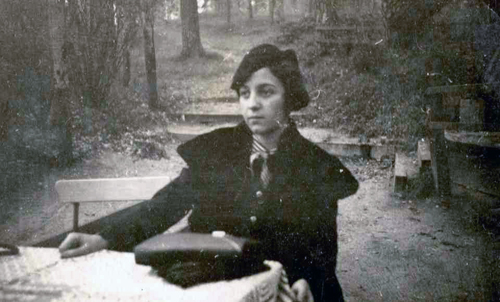
NEW YORK (Press Release) – AJC announces the publication of Exit Berlin: How One Woman Saved Her Family from Nazi Germany. Authored by Charlotte Bonelli, director of AJC Archives, and published by Yale University Press, Exit Berlin offers unique insights into Nazi Germany and the Holocaust from the perspective of one young German Jewish woman.
“Always illuminating, full of moral tension and high drama, the letters of Luzie Hatch exchanged with her relations amount to an eyewitness account that allows us to penetrate the myths and statistics that sometimes obscure the hard facts of the Holocaust,” says acclaimed writer Jonathan Kirsch.
The entire collection of 300 letters was discovered in Luzie’s Forest Hills, NY, apartment, where she had lived alone for more than 61 years. She was meticulously organized in saving copies of letters she sent to relatives and friends, and then filing them together with responses she received. “It is almost unheard of for personal correspondence from this period to be matching,” says Bonelli. “The collection is extremely valuable.”
With the vital help of an American cousin, Arnold Hatch, Luzie had managed to flee Berlin shortly after Kristallnacht in November 1938, resettle in New York, and then do what she could to assist her parents and other relatives left behind. She changed her name from Hecht to Hatch.
The correspondence to and from Germany, Shanghai, Vichy France, Bolivia, England and Canada reveals much history, some new to even those well-acquainted with the Holocaust. “Just when you think there is nothing new to write on the Holocaust here it is. How an average Jewish American family responded to the Holocaust,” says Carol Mann, the literary agent who represented the book.
In addition to 85 letters Bonelli chose to include in Exit Berlin, her own interviews with Hecht family members, correspondents’ descendants, survivors of the Vichy transports, and historians in the U.S.,Germany, Israel, England, and Canada, weave a saga of one extended Jewish family during the Holocaust.
“Your intention of coming to America is sheer insanity and you would find the situation horrible,” writes Ida Hatch in May 1933, when Luzie’s father first appeals in writing for help after Hitler’s rise to power. The bulk of the letters are with Ida’s son, Arnold, who assumed responsibility for the family business after his father passed. He also assumed the contact with Luzie’s family. Luzie herself is persistent and persuades Arnold to help get her to New York, so she can be free and, hopefully, arrange for her family to follow.
The letters Arnold wrote to Luzie and to relatives in Germany offer insights into his own thinking regarding the plight of his relatives, most of whom he did not know. Conflicting with his sense of moral obligation to assist were the economic and political realities that influenced his cautious approach. There was the Depression’s lingering impact, demands of running his own business, and the everyday realities and challenges of rescue, including immigration laws, transportation challenges, and options other than the United States.
“Luzie Hatch found herself sandwiched between two profoundly conflicting forces: her American cousin’s reasonable caution and the desperation of her relatives in Germany,” says Bonelli. “It was a delicate situation for a single 27-year-old who was attempting to make her way in a new country.”
Arnold, living and working near Albany, NY, was crucial to the cause. Luzie not only maintained direct contact with her American cousin about her own situation, but she also became the intermediary between him and relatives who, after learning of Luzie’s successful immigration and transition to American life, sought the same. Since Arnold did not know German and his relatives could not write in English, Luzie was both translator and advocate.
And she did all this while working at the American Jewish Committee (AJC). By chance, she landed a job there four months after her arrival in New York, and would work at AJC until her retirement in 1977.
In her early years at the organization, Hatch was indispensable to an AJC initiative, working as project assistant on a White Book on Nazi Germany, a multi-volume chronicle of Nazi Germany’s anti-Semitic policies from 1933 to 1939. The volumes treated the full scope of Jewish life in Germany at the time — the civil service, education, army, agriculture, special tax regulation, registration of Jewish property, and many other subjects.
Years after the war, Luzie was able to reconcile with her homeland. Working at AJC during the 1960s and 1970s, she became a principal interlocutor for German groups visiting the AJC headquarters in New York. AJC pioneered the development of postwar Jewish ties with Germany, and established a permanent office in Berlin in 1998.
“Luzie could easily have disappeared into the abyss of history,” says Bonelli. But after her death, the estate executor cleaning out the apartment found the letters and contacted Bonelli.
Exit Berlin will be released on April 29.
*
Preceding provided by AJC
*
San Diego Jewish World seeks sponsorships to be placed, as this notice is, just below articles that appear on our site. This is an ideal opportunity for your corporate message or to personally remember a loved one’s contributions to our community. To inquire, call editor Donald H. Harrison at (619) 265-0808 or contact him via donald.harrison@sdjewishworld.com